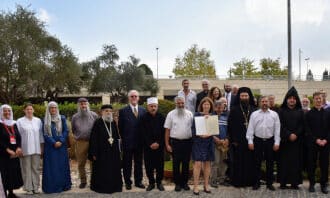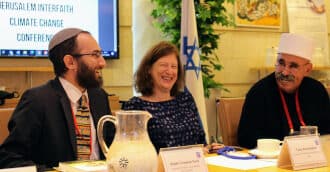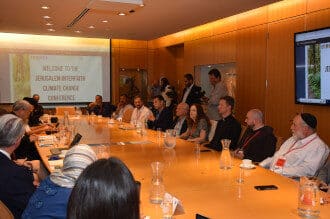The Jerusalem Interfaith Climate Conference was held on November 3, 2022 ahead of the UN Climate Conference COP 27. At the event, religious leaders in Israel gathered to support joint action on climate change.
The Department of World Religions of the Israeli Ministry of Foreign Affairs, in collaboration with the Interfaith Center for Sustainable Development, held a first-of-its-kind interfaith conference on the role of religious leadership in dealing with climate change.
The conference encouraged and empowered religious communities in Israel and around the world to curb human-caused climate change, and to promote the use of renewable energy.
At the event, the religious leaders signed the “Jerusalem Climate Declaration” in which the signatories declared to act urgently in order to mitigate climate change.
The event took place two days before the opening of the COP 27 climate conference of the United Nations, which will take place between November 6 and 18, 2022, in the Sinai Peninsula, in Sharm el-Sheikh, Egypt. In the coming days a series of events are planned for religious leaders from all over the world in different countries, uniting faith communities to act together for the sake of the planet.
Among the signatories of the Declaration: Vatican Ambassador to Israel and Cyprus Archbishop Adolfo Tito Yllana; Rabbi Yuval Cherlow, Head of the Yeshiva Amit Orot Shaul in Tel Aviv; David Freeman, Baha’i Jerusalem representative; Beit Hillel Rabbinic Organization; Druze Imam Jaber Mansour; representative of the Patriarchate Greek Orthodox Archimandrite Matheos Siopsis; representative of the Armenian Patriarchate Reverend Gadasarian, representative of the Custody Alberto Pyle; Father Bishou Zaki of the Coptic Church; and Rabbi Yonatan Neril, founder and director of the Interfaith Center for Sustainable Development, and more.



The Ambassador of the Vatican in Israel, H.E. Archbishop Adolfo Tito Yllana emphasized the importance of the interfaith gathering and the joint work of all religious leaders in Israel and in the world for climate action. He said, “We need a new culture of oneness, that understands that the earth is part of us and we are part of the earth. We are interconnected.”
Tania Berg-Rafaeli, director of the Department of World Religions at the Ministry of Foreign Affairs, said, “The State of Israel and the government ministries, including our ministry, consider the engagement with the climate issue to be of utmost importance and will work to continue this type of cooperation between civil, social and religious parties for this common and critical goal.”
Rabbi Yonatan Neril, founder and director of the Interfaith Center for Sustainable Development, said, “the climate crisis is a spiritual crisis and therefore we need the world’s religious leaders to address the problem. We will do everything to unite as many religious leaders as possible in the world to act on the climate issue.”
